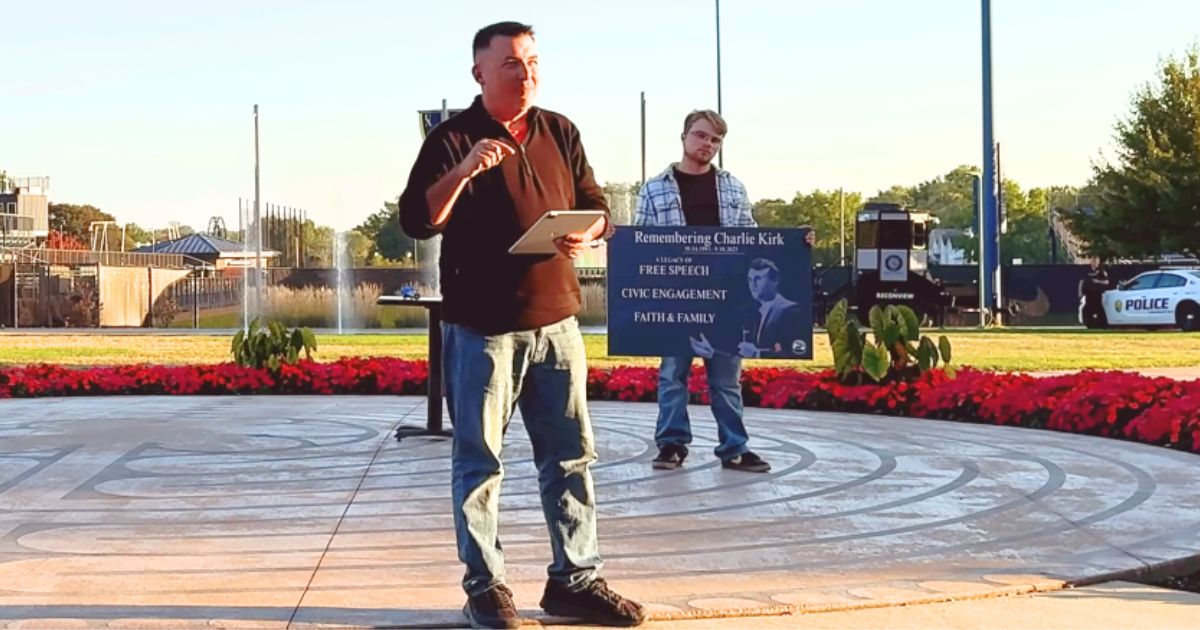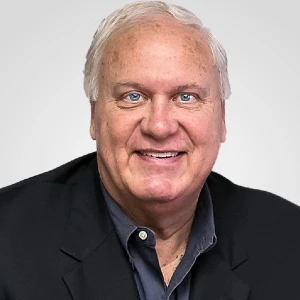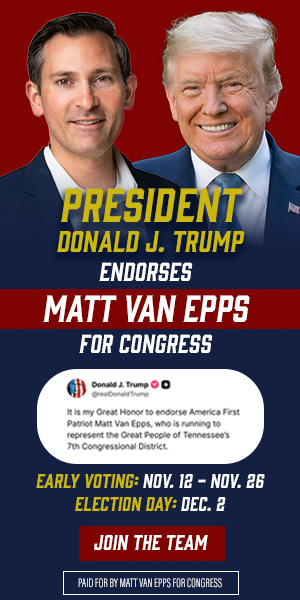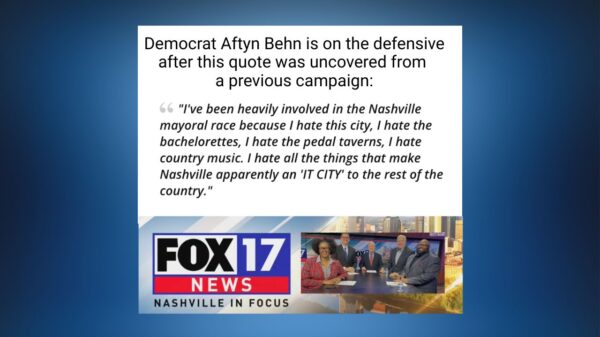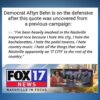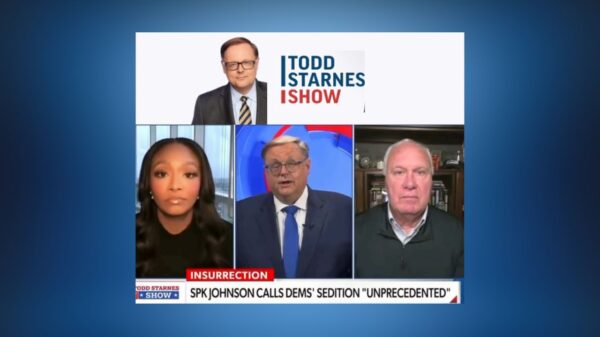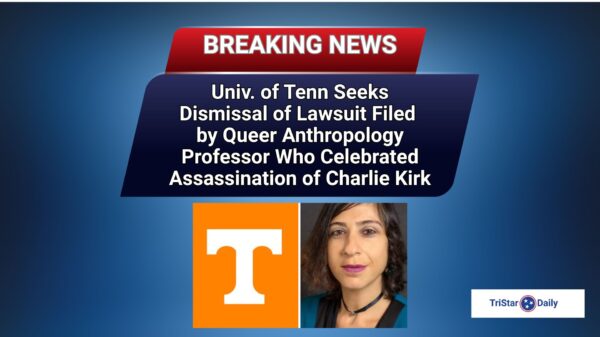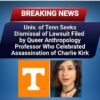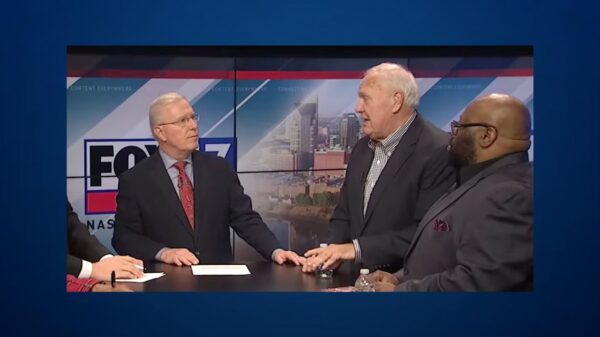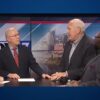Pastor and history vlogger Chris Mowery spoke to a bipartisan crowd at the University of Akron about the choices Americans face after the assassination of Charlie Kirk. A transcript of the video is below.
Video Transcript:
One of the drawbacks to going last is that, inevitably, somebody else said something that I was planning to say. But it’s a privilege to be here. I know I’m listed in the program there as pastor and that is one of the hats that I have worn for most of my adult life, but I’m also historian. That’s kind of my day job. And I think that’s how I ended up here is my connection through my history work. And so I’m going to kind of weave those two together a little bit. And what I wanted to share tonight, we are gathered here tonight as representatives of different parties, of different backgrounds, of different beliefs.
Some of us here are here because they admired Charlie Kirk, because they believed in what he believed and they stand for what he stood for. Some of us here are respectful critics, people who disagreed with him profoundly, but are here united in our horror over the manner of his death.
We’re gathered here not to debate tonight, but to mourn. To mourn that his death happened, that we couldn’t find enough common ground to where we could speak to each other without it becoming violence. And as many others have said here, before Charlie Kirk was a public figure, he would tell you first and foremost that he was a man. He was a husband. To Erica, he was first above all those things a child of God and a Christian. That he was a father to two small children.
As a father myself, one of my greatest fears, of course, is something happening to my kids. But second only to that is one of my kids having to grow up without a parent. I grew up without my parents, and I can’t imagine now what his children have to face. That voice that they had in their lives, the voice that many of us had in our lives, is now gone.
To understand the life that Charlie Kirk lived, we have to understand a choice that he made. He chose from a very young age to enter the arena of ideas. He chose not to seek out a safe space where he only found people who agreed with him, who thought like him, who spoke like him, who believed like him. He didn’t look for sympathetic audiences. He went to college campuses where he very often found what he would find to be a hostile audience.
He went to where people held passionate, often opposing views to his own, But that’s what he was seeking out. He had the courage to do that. He had the courage to say, “We need to talk.”
This tragedy that happened that we saw unfold on our screens just a few days ago, it didn’t happen in a vacuum. It happened in a nation that is wrestling with an identity crisis.
We’re wrestling about who we are at our core. A nation where disagreement too often warps into contempt for people who think differently than we do. When we see opponents not as fellow citizens but as enemies.
It happened in a nation where, as one man said long ago, our passions have become strained. 164 years ago, as our nation was on the verge of a civil war, Abraham Lincoln stood before the Capitol building for his first inauguration and he said, “We are not enemies but friends. We must not be enemies. Though passion may have strained, it must not break our bonds of affection.”
That plea is one that echoes down to us today. It asks us that question. Do the bonds of affection as Americans still hold?
Do we see a friend behind our political opponent, the American, the fellow citizen behind the political label? It asked the question, “Can we find common ground?”
For Charlie, his convictions, like mine and like many of ours, were rooted in his Christian faith. A faith that shaped his view of the world and his role in that world. A faith like so many other great moral traditions that calls its followers to a high and often difficult standard, not of agreement, but of how we treat one another.
The Apostle Paul was writing to a community that was as divided then as we are today. And he said these words. He said, “Clothe yourselves with compassion, kindness, humility, gentleness, and patience. Bear with one another and forgive one another. Over all of these virtues put on love which binds them all together in perfect unity.”
I want to challenge us to honor those words.
Even if you’re not a Christian, I want to encourage you to follow those words of Paul. They don’t demand that we abandon our beliefs. They don’t demand that we compromise those strongly held convictions that we have. They don’t ask us to surrender our principles. They ask us to do something much harder. They ask us to bear with one another.
That we approach our disagreements with humility and our opponents with a baseline of human dignity. That is the hard work of unity. It’s not a feeling. It’s a discipline. It’s a choice to believe that what binds us together as human beings and as Americans is stronger than what tears us apart.
The person who pulled the trigger last week on a college campus in Utah didn’t just want to kill a man. He tried to kill a conversation. He tried to replace a word with a bullet. He sought to answer an argument with assassination, and in this, he proved the tragic truth of something that Charlie Kirk himself said. It’s one of the things I’ve seen replayed most from him in the last few days. He said, “When people stop talking, that’s when you get violence because you start to think that the other side is so evil and they lose their humanity.”
Look around you for a minute. Do you see evil? Because I don’t. I don’t see evil here. I see my fellow citizens, my fellow human beings. I see people who have a right to decency and dignity and love and respect. Whatever your background is, men and women who have strong convictions, strong beliefs, and are willing to stand for them.
Sometimes that means that we stand on opposite sides on difficult issues. Sometimes that means we are opponents in the avenue of ideas and we have a choice to make now in this nation moving forward. D
o we continue down the path of dehumanization, of contempt, of seeing the other side as irredeemably evil or do we in this moment of shared tragedy? Because let’s make no mistake about it. Charlie Kirk was a conservative and he was a Republican. But this is a tragedy that is shared by all of us, whatever our background. This should make all of us sad today.
Do we in this moment choose to find another way? So, as I close, I want to just say that the work of healing this nation doesn’t belong to presidents and politicians. It belongs to you and I sitting here right now. You, many of you are students in college. You’re my daughter’s age. You knew far more about Charlie Kirk than I did before this week, than many of us did. But it belongs to each of us to make a choice about where we go from here in our homes, in our communities, on our campuses, in our conversations online and in person.
The call tonight is not to abandon what we believe in. It’s to defend our beliefs with better arguments, not with bitterness.
It’s to stand for our principles without standing on the dignity of those who believe differently than we do.
To prove that democracy can still work.
To prove that disagreement can be a healthy thing. That we can still talk to one another.
I want to encourage us to leave this place tonight, resolved to answer the plea that President Lincoln gave to the nation on the eve of the Civil War, when the country still had a choice about what direction it wanted to go: to choose words and discourse and conversation or to choose violence, and, unfortunately, our nation chose violence.
We have that same opportunity, and I want to close with these words that he shared in that inauguration address.
He said, “I am loathed to close. We are not enemies, but friends. We must not be enemies. Though passion may have strained it, it must not break our bonds of affection. The mystic cords of memory stretching from every battlefield and patriot grave to every living heart and hearthstone all over this broad land will yet swell the chorus of the Union. When again touched, as surely they will be, by the better angels of our nature.”

